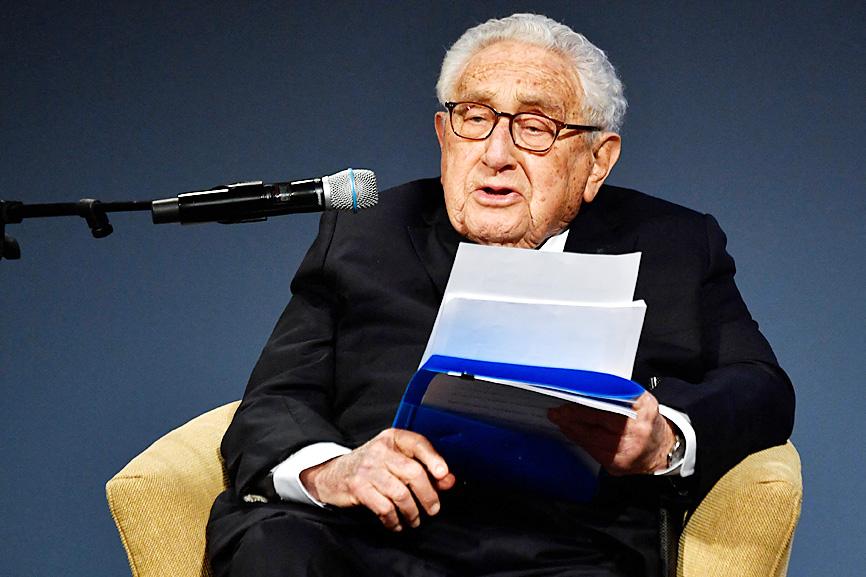Former US secretary of state Henry Kissinger on Friday said that US-China tensions threaten to engulf the entire world and could lead to an Armageddon-like clash between the two military and technology giants.
The 97-year-old, who as an adviser to then-US president Richard Nixon crafted the 1971 unfreezing of relations between Washington and Beijing, said the mix of economic, military and technological strengths of the two superpowers carries more risks than the Cold War with the Soviet Union.
Strains with China are “the biggest problem for America, the biggest problem for the world,” Kissinger told the McCain Institute’s annual Sedona Forum on global issues.

Photo: AFP
“If we can’t solve that, then the risk is that all over the world a kind of cold war will develop between China and the United States,” Kissinger said.
While nuclear weapons were large enough to damage the entire globe during the Cold War, he said advances in nuclear technology and artificial intelligence — where China and the US are both leaders — have multiplied the doomsday threat.
“For the first time in human history, humanity has the capacity to extinguish itself in a finite period of time,” Kissinger said. “We have developed the technology of a power that is beyond what anybody imagined even 70 years ago.”
“And now, to the nuclear issue is added the high-tech issue, which in the field of artificial intelligence, in its essence is based on the fact that man becomes a partner of machines and that machines can develop their own judgement,” he said. “So in a military conflict between high-tech powers, it’s of colossal significance.”
The Cold War between the US and the Soviet Union during the decades after World War II was more one-dimensional, focused on nuclear weapons competition, said Kissinger, one of the leading strategic thinkers of the past six decades.
“The Soviet Union had no economic capacity. They had military technological capacity,” he said. They “didn’t have developmental technological capacity as China does. China is a huge economic power in addition to being a significant military power.”
Kissinger said US policy toward China must take a two-pronged approach: standing firm on US principles to demand China’s respect, while maintaining a constant dialogue and finding areas of cooperation.
“I’m not saying that diplomacy will always lead to beneficial results,” he said. “This is the complex task we have... Nobody has succeeded in doing it completely.”

MISINFORMATION: The generated content tends to adopt China’s official stance, such as ‘Taiwan is currently governed by the Chinese central government,’ the NSB said Five China-developed artificial intelligence (AI) language models exhibit cybersecurity risks and content biases, an inspection conducted by the National Security Bureau (NSB) showed. The five AI tools are: DeepSeek, Doubao (豆包), Yiyan (文心一言), Tongyi (通義千問) and Yuanbao (騰訊元寶), the bureau said, advising people to remain vigilant to protect personal data privacy and corporate business secrets. The NSB said it, in accordance with the National Intelligence Services Act (國家情報工作法), has reviewed international cybersecurity reports and intelligence, and coordinated with the Ministry of Justice Investigation Bureau and the National Police Agency’s Criminal Investigation Bureau to conduct an inspection of China-made AI language

LIMITS: While China increases military pressure on Taiwan and expands its use of cognitive warfare, it is unwilling to target tech supply chains, the report said US and Taiwan military officials have warned that the Chinese People’s Liberation Army (PLA) could implement a blockade within “a matter of hours” and need only “minimal conversion time” prior to an attack on Taiwan, a report released on Tuesday by the US Senate’s China Economic and Security Review Commission said. “While there is no indication that China is planning an imminent attack, the United States and its allies and partners can no longer assume that a Taiwan contingency is a distant possibility for which they would have ample time to prepare,” it said. The commission made the comments in its annual

BOOST IN CONFIDENCE: The sale sends a clear message of support for Taiwan and dispels rumors that US President Donald Trump ‘sold out’ the nation, an expert said The US government on Thursday announced a possible sale to Taiwan of fighter jet parts, which was estimated to cost about US$330 million, in a move that an expert said “sends a clear message of support for Taiwan” amid fears that Washington might be wavering in its attitude toward Taipei. It was the first announcement of an arms sale to Taiwan since US President Donald Trump returned to the White House earlier this year. The proposed package includes non-standard components, spare and repair parts, consumables and accessories, as well repair and return support for the F-16, C-130 and Indigenous Defense Fighter aircraft,

CHECKING BOUNDARIES: China wants to disrupt solidarity among democracies and test their red lines, but it is instead pushing nations to become more united, an expert said The US Department of State on Friday expressed deep concern over a Chinese public security agency’s investigation into Legislator Puma Shen (沈伯洋) for “secession.” “China’s actions threaten free speech and erode norms that have underpinned the cross-strait ‘status quo’ for decades,” a US Department of State spokesperson said. The Chongqing Municipal Public Security Bureau late last month listed Shen as “wanted” and launched an investigation into alleged “secession-related” criminal activities, including his founding of the Kuma Academy, a civil defense organization that prepares people for an invasion by China. The spokesperson said that the US was “deeply concerned” about the bureau investigating Shen